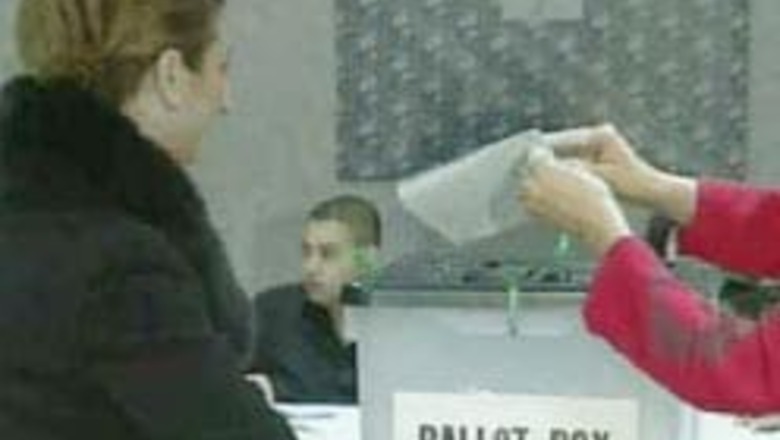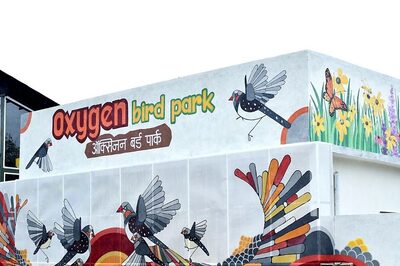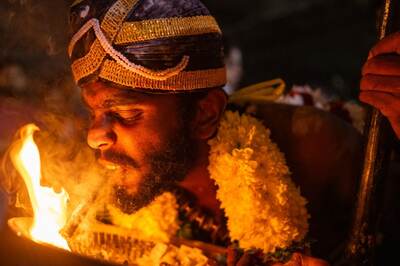
views
Baghdad: After a peaceful election, Iraqis hope their next government will end nearly three years of bloodshed, but rebels and US commanders said on Friday that insurgency in the country was far from over.
In a sign that some militants will fight on regardless of Thursday's Parliamentary poll, three mortar rounds landed near the Interior Ministry in Baghdad. Police said no one was hurt.
Election officials counted and recounted at least 10 million ballots as Iraqis celebrated an election in which many rebellious Sunni Arabs participated for the first time since the fall of Saddam Hussein, pushing turnout to around 70 per cent.
Cities were quiet on the final day of a security lockdown that has sealed borders, banned traffic and put tens of thousands of police and soldiers on the streets.
Preliminary results may take several days and a final tally is not expected before a further two weeks.
Insurgents launched few attacks on election day, but some of them said they had only refrained to allow Sunni Arabs to vote.
"This period of elections is a period of truce, but that does not mean we will stop our military activities," said a man calling himself Abu Qutada, a member of the Islamic Army in Iraq, which includes former Baathists loyal to Saddam Hussein.
US commanders also said they had no illusions that peace would break out after the election.
"The insurgency is not over," Brigadier General Don Alston, chief of communications for US forces in Iraq said.
"Zarqawi is still out there and levels of violence will increase," he said, referring to Jordanian militant Abu Musab al-Zarqawi, leader of al-Qaeda in Iraq.
The US military said Iraq had issued an arrest warrant for Mullah Halgurd al-Khabir, who it said was believed responsible for the 2003 bombing of the UN Baghdad headquarters, which killed 22 people including envoy Sergio Vieira de Mello.
PAGE_BREAK
It said Khabir was a leader of the insurgent group Army of Ansar al-Sunna with historical ties to Zarqawi.
Army General George Casey, the US commander in Iraq, said the number of US troops in the country should return to a pre-election ?baseline? by the end of January or early February. Numbers were boosted to bolster security for the vote.
With voting seen as closer than in the last election on January 30, which many Sunni Arabs boycotted, top politicians kept a low profile, waiting to see what hand the voters had dealt them before opening coalition negotiations that may last months.
The major test is whether violent differences among ethnic and sectarian groups, all of which are heavily armed, can be resolved inside the new four-year representative parliament.
"I'm sure the negotiations will be tough," said Salaam Ali, a 35-year-old Shi'ite shopkeeper on the unusually calm streets of central Baghdad.
"We hope the elections will bring all Iraqis together Shi'ites, Sunnis and others," he said.
Shi'ite alliance
The ruling United Iraqi Alliance, a Shi'ite Islamist bloc, is widely expected to remain the biggest group.
The electoral commission said it believed 10-11 million of Iraq's 15 million eligible voters cast their ballots.
"We'll need a couple of days to know a precise number,? electoral commissioner Farid Ayar said, cautioning Iraqis not to expect a definitive tally until early January.
The commission is expecting to face dozens of complaints from parties feeling cheated by irregularities in the vote. All will need to be investigated, perhaps delaying the final result.
"He's a strong man and has the ability to tackle difficult issues," said Kamal Abdulathim, 35, who voted for Allawi in the mixed Shi'ite-Sunni city of Baquba in central Iraq.
It may take over two weeks to allocate the 275 seats in the Parliament, which must then elect a president and two deputies. They will ask the biggest bloc in Parliament to name a prime minister, who must win a simple majority in the assembly.
PAGE_BREAK
"The Iraqi political parties will be looking for their best deal. but it's going to take time," one Western diplomat said. "I do not expect this to be a rapid process."
Among the more taxing challenges facing the government will be amending the new constitution, pushed through parliament and ratified by an October referendum despite fierce opposition from Sunni Arabs, who have been promised it will be reviewed.
The US hopes the vote will allow it gradually to withdraw its 155,000 troops. So do most Iraqis, surveys show.
An Iranian leader described the election in former foe Iraq as ?a victory? that would hasten the departure of US troops.
"We knew from the beginning that the Americans would drown in a quagmire in Iraq and that is what happened," former President Akbar Hashemi Rafsanjani told worshippers at prayers in Tehran.




















Comments
0 comment